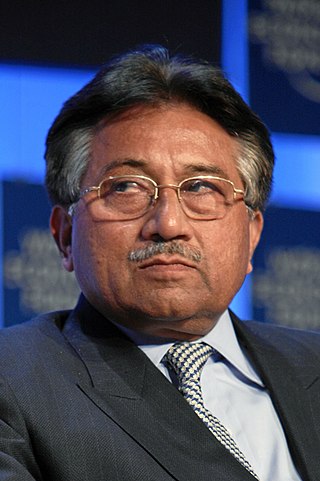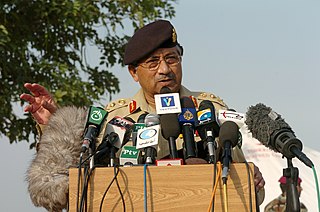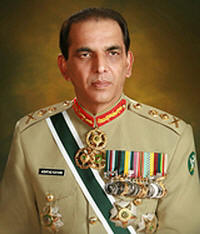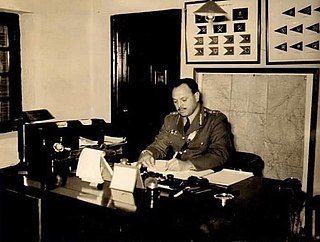
Pervez Musharraf was a Pakistani military officer and politician who served as the tenth president of Pakistan from 2001 to 2008.

Mohammad Ayub Khan was a Pakistani four-star rank general and politician who held several positions: the first native and third commander-in-chief of the Pakistan Army (1951–1958), the first chief martial law administrator (1958–1962), and the second president of Pakistan (1958–1969). He rose to prominence after his 1958 Pakistani coup d'état which ousted President Iskandar Ali Mirza. His presidency ended in 1969 when he resigned amid the 1968–69 Pakistan revolution.

The Pakistan Muslim League Urdu: پاکستان مسلم لیگ (ق); Pākistān Muslim Līg (Qāf), Acronyms: PML(Q), PML-Q, PMLQ, "Q League" is a political party in Pakistan. As of the 2024 parliamentary election, it has a representation of five seats. It previously served as an ally of former prime minister Raja Pervez Ashraf's government, and led a joint election campaign in 2013 alongside Pakistan Peoples Party (PPP) in Punjab and Balochistan provinces against its rival Pakistan Muslim League (N), a fiscally conservative and centre-right force.

The 1999 military takeover in Pakistan was a bloodless coup d'état initiated by the military staff at the Joint Staff HQ working under the Chairman of the Joint Chiefs of Staff Committee and Chief of Army Staff General Pervez Musharraf. The instigators seized control of the civilian government of the popularly elected Prime Minister Nawaz Sharif on 12 October 1999. On 14 October, General Musharraf, acting as the country's Chief Executive, issued a controversial provisional order that suspended the Constitution of Pakistan.

Gohar Ayub Khan was a Pakistani politician, businessman, army officer, and a leader of the Pakistan Muslim League (N), who held ministerial positions during the administration of prime minister Nawaz Sharif.

General Muhammad Aziz KhanNI(M) HI(M) SBt TBt, better known as Aziz Khan, is a retired Pakistani four-star rank army general who served as the 11th Chairman of the Joint Chiefs of Staff Committee, appointed in October 2001 until his retirement in 2005.

Admiral Fasih BokhariNI(M) HI(M) SI(M) SBt PGAT was a Pakistani admiral who served as the Chief of Naval Staff from 1997 to 1999. He was a well-known pacifist and a prominent political figure as the Chief of Naval Staff from 1997 until his voluntary resignation in 1999, which stemmed from his staunch opposition to the then-Pakistani President Pervez Musharraf's instigation of the Kargil War with India, a conflict that Bokhari reportedly saw as an act of inappropriate and uncoordinated aggression from Pakistan and one that subsequently led him into a bitter dispute with Musharraf. Bokhari also served as the chairman of the National Accountability Bureau, a Pakistani anti-corruption agency.
Lieutenant General Ali Kuli Khan KhattakHI(M) is a retired Pakistani three-star rank general officer and former field commander of X Corps.

Saeed Uz Zaman Siddiqui was a Pakistani jurist and legislator of great prominence who formerly served as the 15th Chief Justice of Pakistan and, prior to that, the 7th Chief Justice of the Sindh High Court. At the time of his death, he was serving as the 31st Governor of Sindh.

General Ashfaq Parvez KayaniNI(M) HI(C) HI(M) LoM LoH OMM, is a retired four-star general of the Pakistan Army who served as the eighth chief of army staff, being appointed on 29 November 2007 after his predecessor Pervez Musharraf retired from his military service and remained in the office until 29 November 2013.
Air Chief Marshal Parvaiz Mehdi QureshiNI(M) HI(M) SI(M) SBt best known as PQ Mehdi, is a retired four-star air officer and former fighter pilot who served as the eighth Chief of Air Staff (CAS) of the Pakistan Air Force from 1997 until his retirement in 2000.

The Muslim League was the original successor of the All-India Muslim League that led the Pakistan Movement to achieve an independent nation. Five of the country's Prime Ministers have been affiliated with this party, namely Liaquat Ali Khan, Khwaja Nazimuddin, Mohammad Ali Bogra, Chaudhry Muhammad Ali, and Ibrahim Ismail Chundrigar. The Muslim League was defeated in the 1955 elections to the Constituent Assembly by a political alliance known as the United Front. However, Prime Minister Chaudhry Mohammad Ali and later Prime Minister Ibrahim Ismail Chundrigar were appointed to lead a minority government. The party was dissolved in 1958 after the declaration of Martial Law by General Muhammad Ayub Khan, the Commander-in-Chief of Pakistan Army.

The 1958 Pakistani military coup was the first military coup in Pakistan that took place on 27 October 1958. It resulted in the toppling of Iskandar Ali Mirza, the president of Pakistan, by Muhammad Ayub Khan, the commander-in-chief of the Pakistan Army.

Chief of the General Staff is the most coveted position within the Pakistan Army after that of the Chief of the Army Staff (COAS). Although the COAS is the head of the land forces, the CGS is "the organizational lead on both intelligence and operations", hence being in charge of the Military Intelligence (MI) and Military Operations (MO) Directorates. Since 1985, a three-star rank Lt. Gen. is appointed to the post.

General Raheel SharifNI(M) HI(M) LOM is a retired four-star army general of the Pakistan Army who served as the ninth chief of army staff from 29 November 2013 to 29 November 2016. After his retirement as Pakistan's army chief, he was appointed as the commander of the Islamic Military Counter Terrorism Coalition, a 41-nation alliance of Muslim countries headquartered in Riyadh, Saudi Arabia.

The Commander-in-Chief of the Pakistan Army was the professional head of the Pakistan Army from 1947 to 1972. The C-in-C was directly responsible for commanding the army. It was an administrative position and the appointment holder had main operational command authority over the army.

The Imran Khan government was the Federal Cabinet of Pakistan from 20 August 2018 to 10 April 2022. It was formed by Imran Khan following general elections on 25 July 2018, which saw the Pakistan Tehreek-e-Insaaf come to power. The cabinet had 34 federal ministers, 7 ministers of state, 10 Advisers to the Prime Minister and 35 Special Assistants to the Prime Minister (SAPM), most of whom assumed office on 20 August 2018. The government was dissolved on 3 April 2022 following the dissolution of the National Assembly of Pakistan by the President, Arif Alvi at the behest of the Prime Minister, Imran Khan. On 7 April 2022, the Supreme Court of Pakistan ordered the restoration of the Federal Cabinet and National Assembly. On 10 April 2024 the government was defeated in a Vote of No-confidence (VONC) against Imran Khan, leading to its subsequent dissolution.
Waqar Ahmed Seth was a Pakistani jurist who was the Chief Justice of Peshawar High Court between June 2018 and November 2020. He presided over the special court which heard the high treason case against Pervez Musharraf and one of the two judges on a three-judge panel who convicted Musharraf of this crime and sentenced him to death in a controversial decision. That was the first time in Pakistan's history that a military dictator was convicted of high treason.
The Federation of Pakistan v. General (R) Pervez Musharraf, informally known as the Musharraf high treason case, was a court case, in which General Pervez Musharraf who acted in the capacity as chief of army staff, tried for high treason stemming from his imposing of unconstitutional state of emergency on 3 November 2007. In this act, Gen. Musharraf, who was also elected as President of Pakistan, subverted and suspended the writ of the Constitution of Pakistan, dismissing the fifteen justices of the Supreme Court of Pakistan and the fifty-six judges of the provincial High Courts while issuing arrest orders to Chief Justice of Pakistan.
General ; Urdu: جنرل; abbreviated as GEN) is a four-star general officer rank of the Pakistan Army, officially used by the government of Pakistan to denote a supreme leader of the army. It is given to an army general officer upon promotion or possibly a position advancement with a basic pay scale of 22 (BPS-22). It is the highest rank in the armed services, immediately ranks above three-star lieutenant general and below five-star field marshal. Since it is denoted by a four-star rank, it is equivalent to the rank of admiral and air chief marshal. The Pakistan army is led by a senior four-star general as Chief of Army Staff (COAS). The army chief also serves as a senior member of the Joint Chiefs of Staff Committee (JCSC). A new Chief of Army Staff is not always the most senior of the eligible generals; indeed, as of 2016, the new COAS has been the most senior candidate only four of fourteen times. Army general is a powerful rank in the country designed to command security affairs with military leadership privileges.













